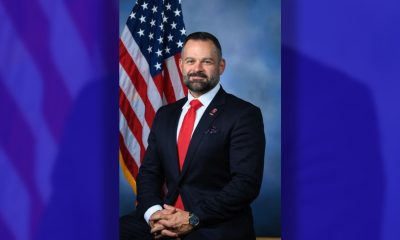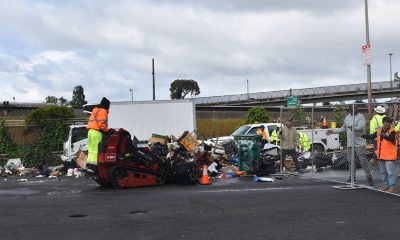Bay Area
Evicted Unhoused Residents Wonder ‘Where Do We Go?’

The Oakland Post connected with displaced, unhoused residents in the wake of city- sanctioned closures of homeless encampments and found many have moved into less stable and safe arrangements.
“It’s just a problem no matter where we move or go [or] how discreet we try to be,” said Nicole Kahele, who grew up in Oakland and lives in an RV with her husband, Elijah Marra.
The City of Oakland evicted Kahele and Marra from a parking lot at Union Point on August 20. The bayside lot had provided space for more than 20 people. Its former residents claim the space helped them to look out for each other.
Since the eviction, Kehele and Marra say they have moved four times and police forced them to move two of those times. Kehele reports that they’ve lost 80 percent of their possessions from these moves because they’ve had limited time to pack. Marra lost tools for fixing bikes, which had provided him a source of income. They also lost a blanket that Kelehe had kept since her stay in the hospital when their son died in childbirth.
Kehele and Marra have rarely left their RV unoccupied since their move because they fear losing more possessions. Kehele says she has interest in staying in a city-sanctioned RV park but doesn’t know if there’s a way to apply since she and Marra rarely go out together. When the first, safe parking RV lot opened in the summer of 2019, Mayor Schaaf claimed it was invitation-only.
“Just knowing that my neighbor would watch my trailer,” said Trevor Vee, who also got evicted from Union Point on August 20. “It gave me a sense of security to be able to go out…and look for a job.”
Vee has moved five times since August 20. When he lived at Union Point, he could get temporary work because he was able to safely leave his trailer. While on the street and away from the encampment, he has been unable to work. When The Oakland Post interviewed him in early October, he was staying temporarily in a friend’s yard, which offered him some stability and work.
“When you have no source of income, it’s kind of hard to feed yourself and I was losing weight at a rapid pace,” said Vee. “Now that I’m on the yard I’ve got a sense of peace again and my weight’s starting to go back up.”
When The Oakland Post interviewed Vee in mid-October, his temporary stay with his friend was ending and he was moving out onto the street again.
The Oakland Post visited the Raimondi Park area in West Oakland after more than two dozen unhoused residents were evicted on Sept. 24, 2019, and heard that Tommy Alexander-Ayala, who’d lived near the park, was staying in a city-sanctioned RV park.
More than five tents have been moved from one side of the street that borders the park to the other side. Some residents have simply moved across the street but no longer have toilets or roadblocks to keep them safe from traffic as the city has removed them.
In nearby Berkeley, some homeless residents and their supporters are questioning the process of forcing homeless people to leave an area without giving them a safe alternative.
Under the slogan @WhereDoWeGoBerk, they successfully resisted an eviction that CalTrans had planned on Oct. 10 when more than two dozen unhoused residents refused to move from an encampment on University Avenue and the I-80 underpass. Housed residents pitched tents and also refused to move in solidarity.
“There’s nowhere they can be,” said Andrea Henson, an activist who pitched a tent at the encampment and helped to organize resistance to their eviction. Laws making staying on the sidewalk illegal in Berkeley have left its homeless population unsure of where they can legally go after an eviction.
“I’m not going to let my friend lose all his stuff while he’s at work,” said Henson to police in a video posted to Twitter where she protected the possessions of an unhoused resident who had to be at work during the attempted eviction.
Activism
OP-ED: AB 1349 Puts Corporate Power Over Community
Since Ticketmaster and Live Nation merged in 2010, ticket prices have jumped more than 150 percent. Activities that once fit a family’s budget now take significant disposable income that most working families simply don’t have. The problem is compounded by a system that has tilted access toward the wealthy and white-collar workers. If you have a fancy credit card, you get “presale access,” and if you work in an office instead of a warehouse, you might be able to wait in an online queue to buy a ticket. Access now means privilege.

By Bishop Joseph Simmons, Senior Pastor, Greater St. Paul Baptist Church, Oakland
As a pastor, I believe in the power that a sense of community can have on improving people’s lives. Live events are one of the few places where people from different backgrounds and ages can share the same space and experience – where construction workers sit next to lawyers at a concert, and teenagers enjoy a basketball game with their grandparents. Yet, over the past decade, I’ve witnessed these experiences – the concerts, games, and cultural events where we gather – become increasingly unaffordable, and it is a shame.
These moments of connection matter as they form part of the fabric that holds communities together. But that fabric is fraying because of Ticketmaster/Live Nation’s unchecked control over access to live events. Unfortunately, AB 1349 would only further entrench their corporate power over our spaces.
Since Ticketmaster and Live Nation merged in 2010, ticket prices have jumped more than 150 percent. Activities that once fit a family’s budget now take significant disposable income that most working families simply don’t have. The problem is compounded by a system that has tilted access toward the wealthy and white-collar workers. If you have a fancy credit card, you get “presale access,” and if you work in an office instead of a warehouse, you might be able to wait in an online queue to buy a ticket. Access now means privilege.
Power over live events is concentrated in a single corporate entity, and this regime operates without transparency or accountability – much like a dictator. Ticketmaster controls 80 percent of first-sale tickets and nearly a third of resale tickets, but they still want more. More power, more control for Ticketmaster means higher prices and less access for consumers. It’s the agenda they are pushing nationally, with the help of former Trump political operatives, who are quietly trying to undo the antitrust lawsuit launched against Ticketmaster/Live Nation under President Biden’s DOJ.
That’s why I’m deeply concerned about AB 1349 in its current form. Rather than reining in Ticketmaster’s power, the bill risks strengthening it, aligning with Trump. AB 1349 gives Ticketmaster the ability to control a consumer’s ticket forever by granting Ticketmaster’s regime new powers in state law to prevent consumers from reselling or giving away their tickets. It also creates new pathways for Ticketmaster to discriminate and retaliate against consumers who choose to shop around for the best service and fees on resale platforms that aren’t yet controlled by Ticketmaster. These provisions are anti-consumer and anti-democratic.
California has an opportunity to stand with consumers, to demand transparency, and to restore genuine competition in this industry. But that requires legislation developed with input from the community and faith leaders, not proposals backed by the very company causing the harm.
Will our laws reflect fairness, inclusion, and accountability? Or will we let corporate interests tighten their grip on spaces that should belong to everyone? I, for one, support the former and encourage the California Legislature to reject AB 1349 outright or amend it to remove any provisions that expand Ticketmaster’s control. I also urge community members to contact their representatives and advocate for accessible, inclusive live events for all Californians. Let’s work together to ensure these gathering spaces remain open and welcoming to everyone, regardless of income or background.
Activism
Oakland Post: Week of December 31, 2025 – January 6, 2026
The printed Weekly Edition of the Oakland Post: Week of – December 31, 2025 – January 6, 2026

To enlarge your view of this issue, use the slider, magnifying glass icon or full page icon in the lower right corner of the browser window.
Activism
Big God Ministry Gives Away Toys in Marin City
Pastor Hall also gave a message of encouragement to the crowd, thanking Jesus for the “best year of their lives.” He asked each of the children what they wanted to be when they grow up.

By Godfrey Lee
Big God Ministries, pastored by David Hall, gave toys to the children in Marin City on Monday, Dec. 15, on the lawn near the corner of Drake Avenue and Donahue Street.
Pastor Hall also gave a message of encouragement to the crowd, thanking Jesus for the “best year of their lives.” He asked each of the children what they wanted to be when they grew up.
Around 75 parents and children were there to receive the presents, which consisted mainly of Gideon Bibles, Cat in the Hat pillows, Barbie dolls, Tonka trucks, and Lego building sets.
A half dozen volunteers from the Big God Ministry, including Donnie Roary, helped to set up the tables for the toy giveaway. The worship music was sung by Ruby Friedman, Keri Carpenter, and Jake Monaghan, who also played the accordion.
Big God Ministries meets on Sundays at 10 a.m. at the Mill Valley Community Center, 180 Camino Alto, Mill Valley, CA Their phone number is (415) 797-2567.
-

 Bay Area4 weeks ago
Bay Area4 weeks agoPost Salon to Discuss Proposal to Bring Costco to Oakland Community meeting to be held at City Hall, Thursday, Dec. 18
-

 Activism4 weeks ago
Activism4 weeks agoMayor Lee, City Leaders Announce $334 Million Bond Sale for Affordable Housing, Roads, Park Renovations, Libraries and Senior Centers
-

 Activism4 weeks ago
Activism4 weeks agoOakland Post: Week of December 10 – 16, 2025
-

 Activism4 weeks ago
Activism4 weeks agoOakland School Board Grapples with Potential $100 Million Shortfall Next Year
-

 Arts and Culture4 weeks ago
Arts and Culture4 weeks agoFayeth Gardens Holds 3rd Annual Kwanzaa Celebration at Hayward City Hall on Dec. 28
-

 Activism4 weeks ago
Activism4 weeks ago2025 in Review: Seven Questions for Black Women’s Think Tank Founder Kellie Todd Griffin
-

 Advice4 weeks ago
Advice4 weeks agoCOMMENTARY: If You Don’t Want Your ‘Black Card’ Revoked, Watch What You Bring to Holiday Dinners
-

 Activism4 weeks ago
Activism4 weeks agoAnn Lowe: The Quiet Genius of American Couture





















































